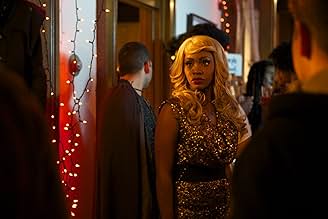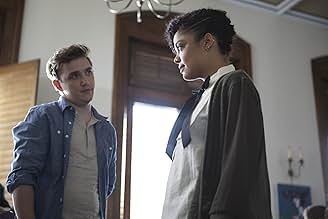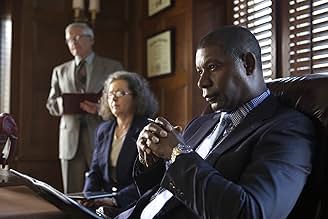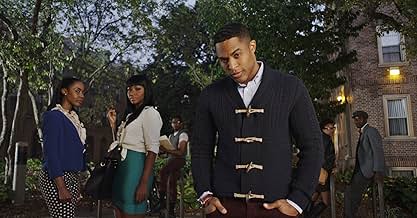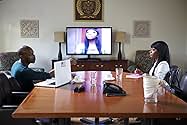The lives of four black students at an Ivy League college.The lives of four black students at an Ivy League college.The lives of four black students at an Ivy League college.
- Awards
- 13 wins & 28 nominations total
Brandon P Bell
- Troy Fairbanks
- (as Brandon Bell)
Kate Gaulke
- Annie
- (as Katie Gaulke)
Bryan Daniel Porter
- Gordon
- (as Bryan Porter)
- Director
- Writer
- All cast & crew
- Production, box office & more at IMDbPro
Featured reviews
Actually, I don't understand this film, I mean the story, what it intended to tell us. Maybe it's for Americans only. I thought it could be some underrated cool comedy, but what I just saw was definitely not expected. I kind of felt it was a student politics and if it stayed like that way I would have had no problem. But they said it is a comedy and I did not get any, in between it became a racism thing. I never understood this American racism, why they're making it so complicated. Especially the condition of the US is not looking good right now and this film pours a more oil to it. I'm neither white nor black or an American, and sorry I did not find it a good film. Even more, I don't get, how a television series is getting ready to follow-up it. So no offense for those who liked it, seems I'm in a wrong place. I just rated and reviewed what I felt it deserves, other than that I'm not against the film. I'm out of here!
3/10
3/10
There are plenty of other black films out there that really entertain and sometimes make a point about race perceptions and relations. (see last paragraph)
The filmmakers scripted a real life situation, A racial Halloween Party in Texas...how boring can you get. Whites in black face... zzzzz..huh, oh I fell asleep. Why make a movie about one incidence of jerky white guys.
Then the movie turns into a black Dinner with White People where people chat on and on.
If you are into b/w dialogue just listen to the audio. Nothing to see here except a few very hot sorority girls. The filmmakers must have said, 'let's bring in comments on 'the weave'. Sorry Chris Rock did an entire documentary and it was great.
Was Dear White People a class project? What was the point. "Hey some fraternity dudes can be assholes." Big surprise.
Rent Hollywood Shuffle by Robert Townsend and then check out the reset of his film. He is good.
The filmmakers scripted a real life situation, A racial Halloween Party in Texas...how boring can you get. Whites in black face... zzzzz..huh, oh I fell asleep. Why make a movie about one incidence of jerky white guys.
Then the movie turns into a black Dinner with White People where people chat on and on.
If you are into b/w dialogue just listen to the audio. Nothing to see here except a few very hot sorority girls. The filmmakers must have said, 'let's bring in comments on 'the weave'. Sorry Chris Rock did an entire documentary and it was great.
Was Dear White People a class project? What was the point. "Hey some fraternity dudes can be assholes." Big surprise.
Rent Hollywood Shuffle by Robert Townsend and then check out the reset of his film. He is good.
The first 20min was OK... I thought it was going to be funny. Then it gets laughably silly, campy and pretentious. The actors are caricatures of real people. At first you think in the next scene you'll suddenly find more depth and things will come into focus, but no... In the end it's got this sad "Stick to your own people, stop trying to pretend to be white/black if you're not" message which really makes me feel sad for whomever wrote this. What a dark little world they live in. The bits about colleges throwing black-face parties all the time are even a bit ridiculous. The movies based in some fictional ivy league school, but the examples they give are all of tiny colleges no-ones ever heard of. I'm not saying there isn't a race problem in this country, there is for sure. But what this movie is portraying is wildly exaggerated. This is the kind of movie the real racists watch and say "That doesn't happen! It's all made up!" and they're right.
The film is essentially one big soapbox and dropped the ball many times and in many different ways.
I want to talk about the positives first and the reason(s) the film is definitely worth watching: I was really impressed with the production value, the acting (most of it) and the humour. I think Teyonah Parris deserves special mention because she was the character I most empathised with simply because she was the only one looking at things from both angles. Tyler James Williams also stood out due to his humour and commitment to his role.
Keeping in mind that a person (or persons) wrote this script with the intention of instigating discussion about the issues raised, I think it's only fair to discuss those issues in reviews especially as some of the commentary affected my enjoyment of the film.
Obviously the film deals with more substantial issues but those applied (mainly) to the USA so to address a few lesser issues: Hair. This subject grates a little (/a lot) for me because I've never heard white people make comments about black hair. Again, this might be a bigger, more well-known topic in the US but here in the UK, I don't think anyone has ever looked twice at a black person's hair. The obsession appears to lie with black (USA) people, not with white people. What is the problem with someone touching your hair? I had a fringe cut in a few months back and people touched it and made comments. When I have my hair curly, people touch it and make nice comments. It might be annoying for you but hair isn't a race issue, it's a hair issue and anyone who focuses on this 'issue' needs to get over it. When Teyonah's character expressed annoyance with being asked if she 'weaved' her hair, I couldn't help but wonder why that was a problem. First of all, how many people say 'Google it'? We make verbs out of nouns all the time and the fact that her white friend asked if it was her own hair, instead of assuming that it wasn't, actually says a lot. Women discuss hair. White women ask each other if they have extensions, if they've had plastic surgery etc. and so for anyone to be annoyed at being asked if they are wearing a weave actually highlights how insecure they are. Not every question or action by a white person is about race. Sometimes it's genuinely about curiosity and taking interest in another person. If you are so touchy about every subject, white people will not want to talk to you for fear of offending you, not because they are racist.
There were other bits of commentary that I took issue with but I don't want my review to turn into a soapbox, so I'll move on to the main gripes I had with the film: When Tessa's character stated that it wasn't possible for black people to be racist, the film lost all credibility. The definition of 'racist' is not up for debate. We have dictionaries to clarify and after consulting one, there is absolutely no mention that in addition to holding the belief that one race is superior to another "the race believed to be inferior must also be negatively affected in some way". It is indeed possible for a black person to hold the belief that one race is better than another which would in fact, make them a racist. How their racist beliefs affect the race they believe to be inferior is irrelevant to the fact that they would be considered racist.
Finally, I disagree that white people dressing up as black people (make-up and all) is (always) the same thing as 'blackface' and I think the more that people focus on these scenarios as opposed to the real blackface which goes on in the industry, the more that film makers will get away with continuing the real tradition of blackface right under everyone's noses.
It's all about intention. Going to a party and dressing as your idol, make-up and all, is flattering and should be encouraged. There is nothing wrong with wanting to look like someone you idolise and when white people are accused of being racist for donning an afro wig and make-up, all that happens is that white people try to isolate themselves from 'ethnic' people to avoid being accused of racism.
The party in the film however, was 100% racist and offensive because the invitation was decidedly unflattering and had nothing to do with celebrating black people.
True blackface is about 'presenting an acceptable image of black people to the world'. Which is interesting when you consider that the main protagonist of this film is mixed-race. It appears that the lead role was written in such a way that allowed the casting of a light skinned woman when it could just as easily have been written in a way that would allow for a dark skinned woman to make all the same points. Casting a light skinned actress to play a dark skinned black woman, is blackface. Especially considering that they will likely apply dark make-up to her skin. Casting a white woman to play a dark skinned Latin-American woman is in the spirit of blackface. Every time a white or light skinned person is given the role of someone who 'should' be darker, that is blackface.
It's not about the make-up. It's about why you're wearing the make-up and any film which tries to hammer home a point about racism using the controversial theme of blackface, while casting a light skinned woman in the leading role, loses a few stars on IMDb for the sheer hypocrisy.
6/10 (it's good entertainment but the message is a bit off)
I want to talk about the positives first and the reason(s) the film is definitely worth watching: I was really impressed with the production value, the acting (most of it) and the humour. I think Teyonah Parris deserves special mention because she was the character I most empathised with simply because she was the only one looking at things from both angles. Tyler James Williams also stood out due to his humour and commitment to his role.
Keeping in mind that a person (or persons) wrote this script with the intention of instigating discussion about the issues raised, I think it's only fair to discuss those issues in reviews especially as some of the commentary affected my enjoyment of the film.
Obviously the film deals with more substantial issues but those applied (mainly) to the USA so to address a few lesser issues: Hair. This subject grates a little (/a lot) for me because I've never heard white people make comments about black hair. Again, this might be a bigger, more well-known topic in the US but here in the UK, I don't think anyone has ever looked twice at a black person's hair. The obsession appears to lie with black (USA) people, not with white people. What is the problem with someone touching your hair? I had a fringe cut in a few months back and people touched it and made comments. When I have my hair curly, people touch it and make nice comments. It might be annoying for you but hair isn't a race issue, it's a hair issue and anyone who focuses on this 'issue' needs to get over it. When Teyonah's character expressed annoyance with being asked if she 'weaved' her hair, I couldn't help but wonder why that was a problem. First of all, how many people say 'Google it'? We make verbs out of nouns all the time and the fact that her white friend asked if it was her own hair, instead of assuming that it wasn't, actually says a lot. Women discuss hair. White women ask each other if they have extensions, if they've had plastic surgery etc. and so for anyone to be annoyed at being asked if they are wearing a weave actually highlights how insecure they are. Not every question or action by a white person is about race. Sometimes it's genuinely about curiosity and taking interest in another person. If you are so touchy about every subject, white people will not want to talk to you for fear of offending you, not because they are racist.
There were other bits of commentary that I took issue with but I don't want my review to turn into a soapbox, so I'll move on to the main gripes I had with the film: When Tessa's character stated that it wasn't possible for black people to be racist, the film lost all credibility. The definition of 'racist' is not up for debate. We have dictionaries to clarify and after consulting one, there is absolutely no mention that in addition to holding the belief that one race is superior to another "the race believed to be inferior must also be negatively affected in some way". It is indeed possible for a black person to hold the belief that one race is better than another which would in fact, make them a racist. How their racist beliefs affect the race they believe to be inferior is irrelevant to the fact that they would be considered racist.
Finally, I disagree that white people dressing up as black people (make-up and all) is (always) the same thing as 'blackface' and I think the more that people focus on these scenarios as opposed to the real blackface which goes on in the industry, the more that film makers will get away with continuing the real tradition of blackface right under everyone's noses.
It's all about intention. Going to a party and dressing as your idol, make-up and all, is flattering and should be encouraged. There is nothing wrong with wanting to look like someone you idolise and when white people are accused of being racist for donning an afro wig and make-up, all that happens is that white people try to isolate themselves from 'ethnic' people to avoid being accused of racism.
The party in the film however, was 100% racist and offensive because the invitation was decidedly unflattering and had nothing to do with celebrating black people.
True blackface is about 'presenting an acceptable image of black people to the world'. Which is interesting when you consider that the main protagonist of this film is mixed-race. It appears that the lead role was written in such a way that allowed the casting of a light skinned woman when it could just as easily have been written in a way that would allow for a dark skinned woman to make all the same points. Casting a light skinned actress to play a dark skinned black woman, is blackface. Especially considering that they will likely apply dark make-up to her skin. Casting a white woman to play a dark skinned Latin-American woman is in the spirit of blackface. Every time a white or light skinned person is given the role of someone who 'should' be darker, that is blackface.
It's not about the make-up. It's about why you're wearing the make-up and any film which tries to hammer home a point about racism using the controversial theme of blackface, while casting a light skinned woman in the leading role, loses a few stars on IMDb for the sheer hypocrisy.
6/10 (it's good entertainment but the message is a bit off)
I saw this movie after watching the first, brilliant season of the TV series it spawned, and that makes it difficult to review. Because the TV series is so brilliant, so funny, so nuanced, and so well structured, I can't help but see the movie as a dress rehearsal for what was to come. Would I have enjoyed this movie more had I seen it first? Very possibly.
The movie follows a whole bunch of characters as they deal with issues around race, with black characters ranging from revolutionaries to blend-inners and white characters ranging from supportive to racist to really, really racist.
The movie is hugely ambitious, and director Justin Simien wants to squeeze in every idea he's ever had about race into this movie. Unfortunately, the result often feels overstuffed, with too many characters and too many ideas packed into too little space.
Clearly, Simien needed a TV series. In that, he takes the same ideas and is able to fully explore each one and each character, in wonderful detail.
The movie is certainly well worth seeing, but unlike the TV series, I wouldn't call this essential viewing.
The movie follows a whole bunch of characters as they deal with issues around race, with black characters ranging from revolutionaries to blend-inners and white characters ranging from supportive to racist to really, really racist.
The movie is hugely ambitious, and director Justin Simien wants to squeeze in every idea he's ever had about race into this movie. Unfortunately, the result often feels overstuffed, with too many characters and too many ideas packed into too little space.
Clearly, Simien needed a TV series. In that, he takes the same ideas and is able to fully explore each one and each character, in wonderful detail.
The movie is certainly well worth seeing, but unlike the TV series, I wouldn't call this essential viewing.
Did you know
- TriviaSam makes a student film that is critical of what she sees as white people's widespread fear of Barack Obama and titles it "Rebirth of a Nation." This is a reference not only to D.W. Griffith's notoriously racist 1915 Civil War movie Naissance d'une nation (1915) but also to something that filmmaker Spike Lee experienced while he was a first-year student at NYU's graduate film school. After being required to watch Griffith's film and objecting to the fact that his professors taught it only as a milestone in the technical development of cinema with no attention paid to its racism and its legacy of helping to relaunch the KKK, Lee made a student short film titled The Answer (1980) that responded to The Birth of a Nation himself. "The Answer" so offended many of his NYU professors that Lee was nearly expelled from NYU, but was ultimately saved by a faculty vote.
- GoofsWhen Sam is in the dining hall and chastises Kurt for eating in their dining hall - just before she stands up; she closes her Macbook twice.
- Quotes
Professor Bodkin: ...Might I also remind you that I read your entire fifteen-page unsolicited treatise on why the Gremlins is actually about suburban white fear of black culture.
Sam White: The Gremlins are loud, talk in slang, are addicted to fried chicken and freak out when you get their hair wet.
- Crazy creditsThe end credits include photographs of the real-life blackface (and brownface) college parties that inspired the film's climax.
- ConnectionsFeatured in Number One on the Call Sheet: Black Leading Women in Hollywood (2025)
- Soundtracks45 Drum Break
Performed by The Co-Stars
Written by Neely Dinkins Jr. (as Neely Dinkins)
Vito Colapietro Courtesy of Atom Factory Music Licensing
Everything New on Hulu in July
Everything New on Hulu in July
There's a whole lot to love about Hulu's streaming offerings this month — get excited for brand-new series premieres and film favorites to watch at home.
- How long is Dear White People?Powered by Alexa
Details
Box office
- Gross US & Canada
- $4,404,154
- Opening weekend US & Canada
- $347,959
- Oct 19, 2014
- Gross worldwide
- $4,633,961
Contribute to this page
Suggest an edit or add missing content









